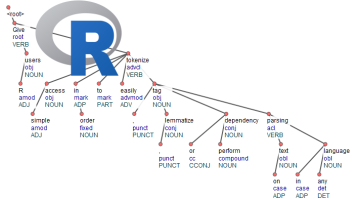This repository contains an R package which is an Rcpp wrapper around the UDPipe C++ library (http://ufal.mff.cuni.cz/udpipe, https://github.com/ufal/udpipe).
- UDPipe provides language-agnostic tokenization, tagging, lemmatization and dependency parsing of raw text, which is an essential part in natural language processing.
- The techniques used are explained in detail in the paper: "Tokenizing, POS Tagging, Lemmatizing and Parsing UD 2.0 with UDPipe", available at https://ufal.mff.cuni.cz/~straka/papers/2017-conll_udpipe.pdf. In that paper, you'll also find accuracies on different languages and process flow speed (measured in words per second).
The udpipe R package was designed with the following things in mind when building the Rcpp wrapper around the UDPipe C++ library:
- Give R users simple access in order to easily tokenize, tag, lemmatize or perform dependency parsing on text in any language
- Provide easy access to pre-trained annotation models
- Allow R users to easily construct your own annotation model based on data in CONLL-U format as provided in more than 100 treebanks available at http://universaldependencies.org
- Don't rely on Python or Java so that R users can easily install this package without configuration hassle
- No external R package dependencies except the strict necessary (Rcpp and data.table, no tidyverse)
The package is available under the Mozilla Public License Version 2.0. Installation can be done as follows. Please visit the package documentation at https://bnosac.github.io/udpipe/en and look at the R package vignettes for further details.
install.packages("udpipe")
vignette("udpipe-tryitout", package = "udpipe")
vignette("udpipe-annotation", package = "udpipe")
vignette("udpipe-universe", package = "udpipe")
vignette("udpipe-usecase-postagging-lemmatisation", package = "udpipe")
# An overview of keyword extraction techniques: https://bnosac.github.io/udpipe/docs/doc7.html
vignette("udpipe-usecase-topicmodelling", package = "udpipe")
vignette("udpipe-parallel", package = "udpipe")
vignette("udpipe-train", package = "udpipe")
For installing the development version of this package: remotes::install_github("bnosac/udpipe", build_vignettes = TRUE)
Currently the package allows you to do tokenisation, tagging, lemmatization and dependency parsing with one convenient function called udpipe
library(udpipe)
udmodel <- udpipe_download_model(language = "dutch")
udmodel
language file_model
dutch-alpino C:/Users/Jan/Dropbox/Work/RForgeBNOSAC/BNOSAC/udpipe/dutch-alpino-ud-2.5-191206.udpipe
x <- udpipe(x = "Ik ging op reis en ik nam mee: mijn laptop, mijn zonnebril en goed humeur.",
object = udmodel)
x
doc_id paragraph_id sentence_id start end term_id token_id token lemma upos xpos feats head_token_id dep_rel misc
doc1 1 1 1 2 1 1 Ik ik PRON VNW|pers|pron|nomin|vol|1|ev Case=Nom|Person=1|PronType=Prs 2 nsubj <NA>
doc1 1 1 4 7 2 2 ging gaan VERB WW|pv|verl|ev Number=Sing|Tense=Past|VerbForm=Fin 0 root <NA>
doc1 1 1 9 10 3 3 op op ADP VZ|init <NA> 4 case <NA>
doc1 1 1 12 15 4 4 reis reis NOUN N|soort|ev|basis|zijd|stan Gender=Com|Number=Sing 2 obl <NA>
doc1 1 1 17 18 5 5 en en CCONJ VG|neven <NA> 7 cc <NA>
doc1 1 1 20 21 6 6 ik ik PRON VNW|pers|pron|nomin|vol|1|ev Case=Nom|Person=1|PronType=Prs 7 nsubj <NA>
doc1 1 1 23 25 7 7 nam nemen VERB WW|pv|verl|ev Number=Sing|Tense=Past|VerbForm=Fin 2 conj <NA>
doc1 1 1 27 29 8 8 mee mee ADP VZ|fin <NA> 7 compound:prt SpaceAfter=No
doc1 1 1 30 30 9 9 : : PUNCT LET <NA> 7 punct <NA>
...
Pre-trained models build on Universal Dependencies treebanks are made available for more than 65 languages based on 101 treebanks, namely:
afrikaans-afribooms, ancient_greek-perseus, ancient_greek-proiel, arabic-padt, armenian-armtdp, basque-bdt, belarusian-hse, bulgarian-btb, buryat-bdt, catalan-ancora, chinese-gsd, chinese-gsdsimp, classical_chinese-kyoto, coptic-scriptorium, croatian-set, czech-cac, czech-cltt, czech-fictree, czech-pdt, danish-ddt, dutch-alpino, dutch-lassysmall, english-ewt, english-gum, english-lines, english-partut, estonian-edt, estonian-ewt, finnish-ftb, finnish-tdt, french-gsd, french-partut, french-sequoia, french-spoken, galician-ctg, galician-treegal, german-gsd, german-hdt, gothic-proiel, greek-gdt, hebrew-htb, hindi-hdtb, hungarian-szeged, indonesian-gsd, irish-idt, italian-isdt, italian-partut, italian-postwita, italian-twittiro, italian-vit, japanese-gsd, kazakh-ktb, korean-gsd, korean-kaist, kurmanji-mg, latin-ittb, latin-perseus, latin-proiel, latvian-lvtb, lithuanian-alksnis, lithuanian-hse, maltese-mudt, marathi-ufal, north_sami-giella, norwegian-bokmaal, norwegian-nynorsk, norwegian-nynorsklia, old_church_slavonic-proiel, old_french-srcmf, old_russian-torot, persian-seraji, polish-lfg, polish-pdb, polish-sz, portuguese-bosque, portuguese-br, portuguese-gsd, romanian-nonstandard, romanian-rrt, russian-gsd, russian-syntagrus, russian-taiga, sanskrit-ufal, scottish_gaelic-arcosg, serbian-set, slovak-snk, slovenian-ssj, slovenian-sst, spanish-ancora, spanish-gsd, swedish-lines, swedish-talbanken, tamil-ttb, telugu-mtg, turkish-imst, ukrainian-iu, upper_sorbian-ufal, urdu-udtb, uyghur-udt, vietnamese-vtb, wolof-wtb.
These have been made available easily to users of the package by using udpipe_download_model
- Accuracy statistics of models provided by the UDPipe authors which you download with udpipe_download_model from the default repository are available at this link.
- Accuracy statistics of models trained using this R package which you download with udpipe_download_model from the bnosac/udpipe.models.ud repository are available at https://github.com/bnosac/udpipe.models.ud.
- For a comparison between UDPipe and spaCy visit https://github.com/jwijffels/udpipe-spacy-comparison
The package also allows you to build your own annotation model. For this, you need to provide data in CONLL-U format. These are provided for many languages at https://universaldependencies.org, mostly under the CC-BY-SA license. How this is done is detailed in the package vignette.
vignette("udpipe-train", package = "udpipe")
Need support in text mining? Contact BNOSAC: http://www.bnosac.be
